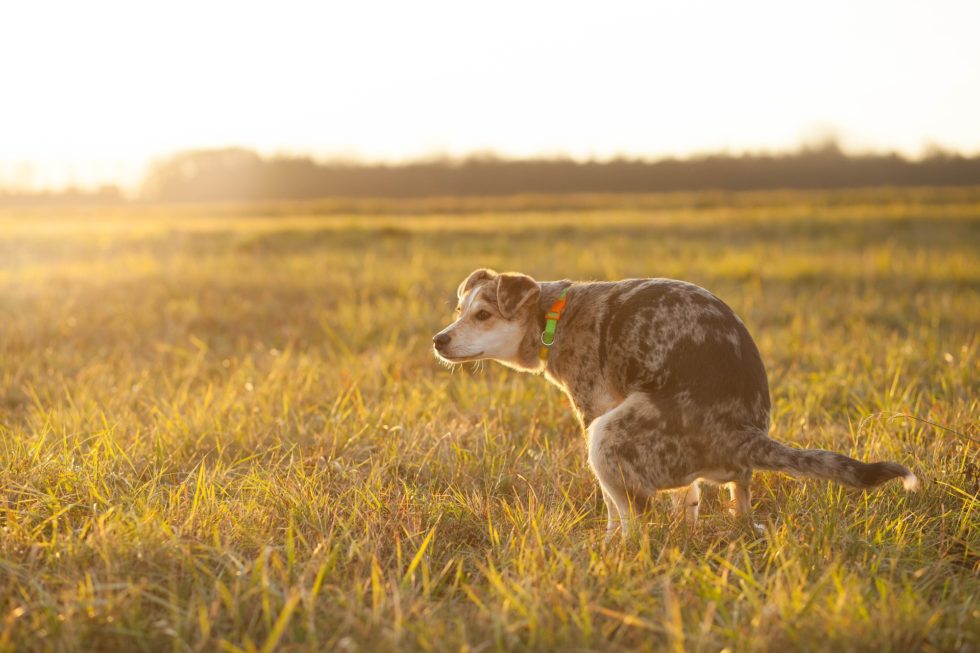Potty Problems

Few things are less welcome in a pet-loving home than potty accidents. Whether of the liquid, solid, or in-between variety, a break in potty training can leave even the most level-headed and loving of pet parents exasperated. Potty problems can have several sources, but here are some of the most common.
Urine:
- Urinary Tract Infections: Most commonly affecting female dogs and male cats, bacteria may enter the bladder and cause inflammation. This leads to blood in the urine, even if you can’t see it without a microscope, which is irritating and leaves your pet with an overwhelming feeling of needing to go potty RIGHT NOW. Research tells us that cats will often associate the location rather than the act of urination with the discomfort they feel and will search for a better place to go to the bathroom than their litter box. Typically, antibiotics can solve this issue.
- Urinary Stones: While people tend to develop urinary stones in their kidneys, dogs and cats form them in their urinary bladders. There are multiple types of stones that vary based on their chemical composition. Some form in response to a UTI and the change in urine pH they cause, inappropriate diet, or genetics. Most stones are evidenced by tiny pieces, called crystals, that are visible under a microscope and can be seen on an ultrasound. In males, crystals can get large enough to block the urethra and therefore urine flow, leading to a life-threatening emergency. If your male cat or dog is ever trying to potty with no production, get to the nearest vet ASAP.
- Chronic Diseases: Diabetes, thyroid disease, kidney dysfunction, and Cushing’s disease can all increase urine production in dogs and cats. Simple blood work can diagnose these problems, and urinary accidents tend to stop once the disease is being treated.
- Stress: Cats can develop the inflammation of the bladder seen in UTIs in the absence of bacteria. They still experience the discomfort and urge to urinate but do not need antibiotics. It’s important to rule out and treat other causes of inappropriate urination first, but your Pet’s Favorite Vet team can help you manage your cat’s stress and redirect them to the proper place for urination.
Poo:
- Worms: Intestinal parasites are often invisible to the naked eye and can cause changes in bowel movement, including their urgency. Even pets on great parasite protection, such as Simparica Trio or ProHeart, can develop intestinal parasites because no product prevents all parasites. A stool test by the Pet’s Favorite Vet team can identify parasites present and inform proper deworming.
- A REALLY Good Meal: By which we mean something they were not supposed to eat. A meal that is too rich, too rotten, or too fatty can cause rapid changes in GI bacteria and intestinal inflammation that your pet may need a little help getting over.
- Change in Food: When changing your pet’s diet, they may have a temporary or permanent change in potty habits. The fat and fiber content of the food can speed up or slow GI transit time. It’s best to move slowly from one food to another by taking at least a week to transition.
No matter what the problem, a potty-trained pet having accidents in the house is trying to tell you that something is wrong. Visiting Pet’s Favorite Vet, we can get on the road to helping your pets feel better and keeping your home clean!
About Us
Pet’s Favorite Vet, founded by Dr. Caroline Cofer in 2021, offers Fear Free pet care with warmth and empathy. Our team provides low-stress handling for anxious pets and features a Play Place for cat and dog boarding, daycare, bathing, and a dog park.
